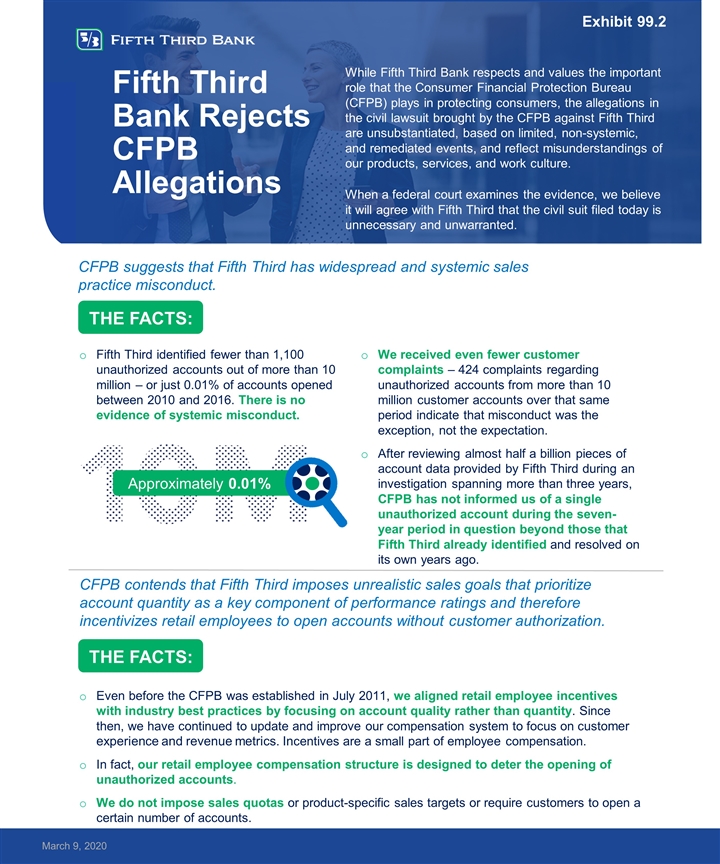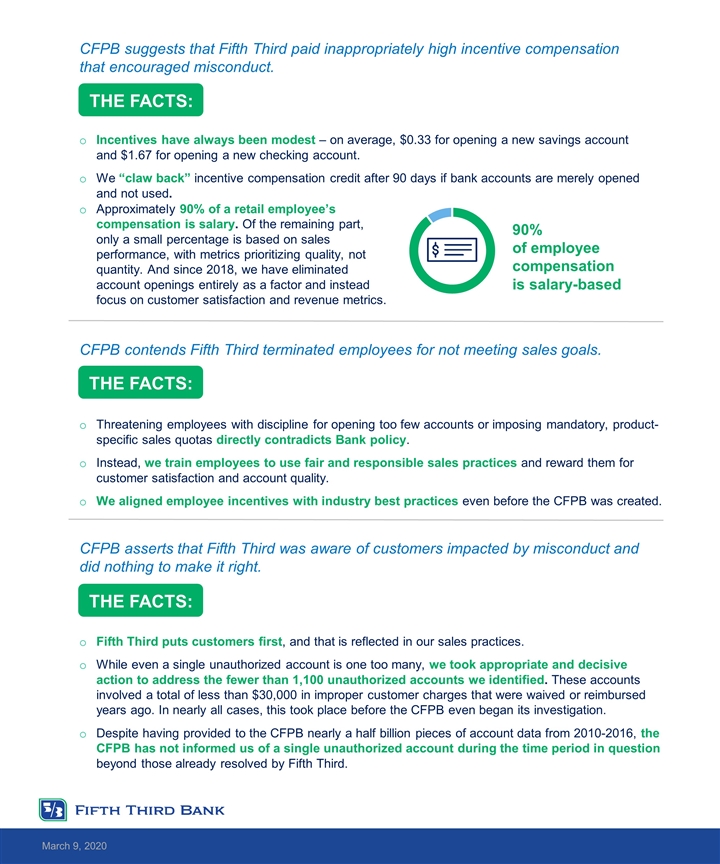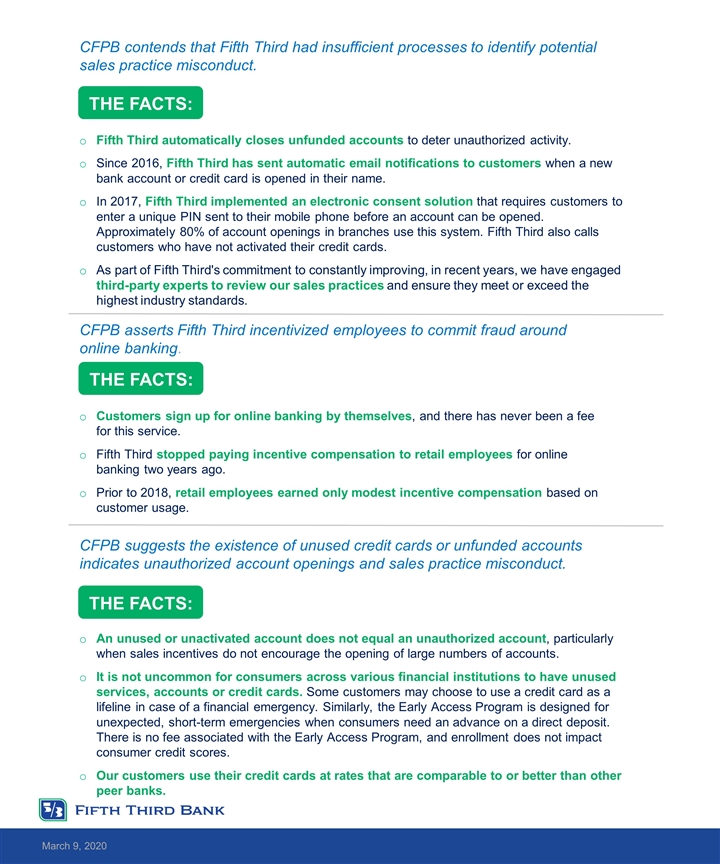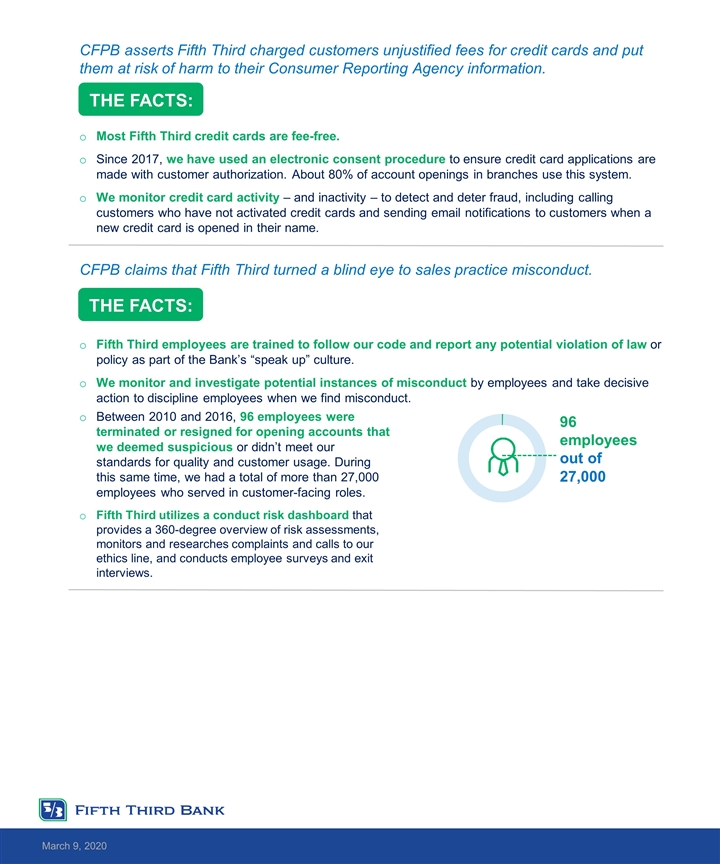Attached files
| file | filename |
|---|---|
| EX-99.3 - EX-99.3 - FIFTH THIRD BANCORP | d895358dex993.htm |
| EX-99.1 - EX-99.1 - FIFTH THIRD BANCORP | d895358dex991.htm |
| 8-K - 8-K - FIFTH THIRD BANCORP | d895358d8k.htm |

Fifth Third Bank Rejects CFPB Allegations While Fifth Third Bank respects and values the important role that the Consumer Financial Protection Bureau (CFPB) plays in protecting consumers, the allegations in the civil lawsuit brought by the CFPB against Fifth Third are unsubstantiated, based on limited, non-systemic, and remediated events, and reflect misunderstandings of our products, services, and work culture. When a federal court examines the evidence, we believe it will agree with Fifth Third that the civil suit filed today is unnecessary and unwarranted. THE FACTS: CFPB contends that Fifth Third imposes unrealistic sales goals that prioritize account quantity as a key component of performance ratings and therefore incentivizes retail employees to open accounts without customer authorization. Even before the CFPB was established in July 2011, we aligned retail employee incentives with industry best practices by focusing on account quality rather than quantity. Since then, we have continued to update and improve our compensation system to focus on customer experience and revenue metrics. Incentives are a small part of employee compensation. In fact, our retail employee compensation structure is designed to deter the opening of unauthorized accounts. We do not impose sales quotas or product-specific sales targets or require customers to open a certain number of accounts. Fifth Third identified fewer than 1,100 unauthorized accounts out of more than 10 million – or just 0.01% of accounts opened between 2010 and 2016. There is no evidence of systemic misconduct. We received even fewer customer complaints – 424 complaints regarding unauthorized accounts from more than 10 million customer accounts over that same period indicate that misconduct was the exception, not the expectation. After reviewing almost half a billion pieces of account data provided by Fifth Third during an investigation spanning more than three years, CFPB has not informed us of a single unauthorized account during the seven-year period in question beyond those that Fifth Third already identified and resolved on its own years ago. Approximately 0.01% CFPB suggests that Fifth Third has widespread and systemic sales practice misconduct. THE FACTS: Exhibit 99.2

CFPB suggests that Fifth Third paid inappropriately high incentive compensation that encouraged misconduct. Incentives have always been modest – on average, $0.33 for opening a new savings account and $1.67 for opening a new checking account. We “claw back” incentive compensation credit after 90 days if bank accounts are merely opened and not used. CFPB contends Fifth Third terminated employees for not meeting sales goals. Threatening employees with discipline for opening too few accounts or imposing mandatory, product-specific sales quotas directly contradicts Bank policy. Instead, we train employees to use fair and responsible sales practices and reward them for customer satisfaction and account quality. We aligned employee incentives with industry best practices even before the CFPB was created. Approximately 90% of a retail employee’s compensation is salary. Of the remaining part, only a small percentage is based on sales performance, with metrics prioritizing quality, not quantity. And since 2018, we have eliminated account openings entirely as a factor and instead focus on customer satisfaction and revenue metrics. 90% of employee compensation is salary-based THE FACTS: THE FACTS: CFPB asserts that Fifth Third was aware of customers impacted by misconduct and did nothing to make it right. Fifth Third puts customers first, and that is reflected in our sales practices. While even a single unauthorized account is one too many, we took appropriate and decisive action to address the fewer than 1,100 unauthorized accounts we identified. These accounts involved a total of less than $30,000 in improper customer charges that were waived or reimbursed years ago. In nearly all cases, this took place before the CFPB even began its investigation. Despite having provided to the CFPB nearly a half billion pieces of account data from 2010-2016, the CFPB has not informed us of a single unauthorized account during the time period in question beyond those already resolved by Fifth Third. THE FACTS:

CFPB suggests the existence of unused credit cards or unfunded accounts indicates unauthorized account openings and sales practice misconduct. An unused or unactivated account does not equal an unauthorized account, particularly when sales incentives do not encourage the opening of large numbers of accounts. It is not uncommon for consumers across various financial institutions to have unused services, accounts or credit cards. Some customers may choose to use a credit card as a lifeline in case of a financial emergency. Similarly, the Early Access Program is designed for unexpected, short-term emergencies when consumers need an advance on a direct deposit. There is no fee associated with the Early Access Program, and enrollment does not impact consumer credit scores. Our customers use their credit cards at rates that are comparable to or better than other peer banks. CFPB contends that Fifth Third had insufficient processes to identify potential sales practice misconduct. Fifth Third automatically closes unfunded accounts to deter unauthorized activity. Since 2016, Fifth Third has sent automatic email notifications to customers when a new bank account or credit card is opened in their name. In 2017, Fifth Third implemented an electronic consent solution that requires customers to enter a unique PIN sent to their mobile phone before an account can be opened. Approximately 80% of account openings in branches use this system. Fifth Third also calls customers who have not activated their credit cards. As part of Fifth Third's commitment to constantly improving, in recent years, we have engaged third-party experts to review our sales practices and ensure they meet or exceed the highest industry standards. THE FACTS: THE FACTS: CFPB asserts Fifth Third incentivized employees to commit fraud around online banking. Customers sign up for online banking by themselves, and there has never been a fee for this service. Fifth Third stopped paying incentive compensation to retail employees for online banking two years ago. Prior to 2018, retail employees earned only modest incentive compensation based on customer usage. THE FACTS:

CFPB asserts Fifth Third charged customers unjustified fees for credit cards and put them at risk of harm to their Consumer Reporting Agency information. Most Fifth Third credit cards are fee-free. Since 2017, we have used an electronic consent procedure to ensure credit card applications are made with customer authorization. About 80% of account openings in branches use this system. We monitor credit card activity – and inactivity – to detect and deter fraud, including calling customers who have not activated credit cards and sending email notifications to customers when a new credit card is opened in their name. THE FACTS: CFPB claims that Fifth Third turned a blind eye to sales practice misconduct. Fifth Third employees are trained to follow our code and report any potential violation of law or policy as part of the Bank’s “speak up” culture. We monitor and investigate potential instances of misconduct by employees and take decisive action to discipline employees when we find misconduct. Between 2010 and 2016, 96 employees were terminated or resigned for opening accounts that we deemed suspicious or didn’t meet our standards for quality and customer usage. During this same time, we had a total of more than 27,000 employees who served in customer-facing roles. Fifth Third utilizes a conduct risk dashboard that provides a 360-degree overview of risk assessments, monitors and researches complaints and calls to our ethics line, and conducts employee surveys and exit interviews. 96 employees out of 27,000 THE FACTS:
